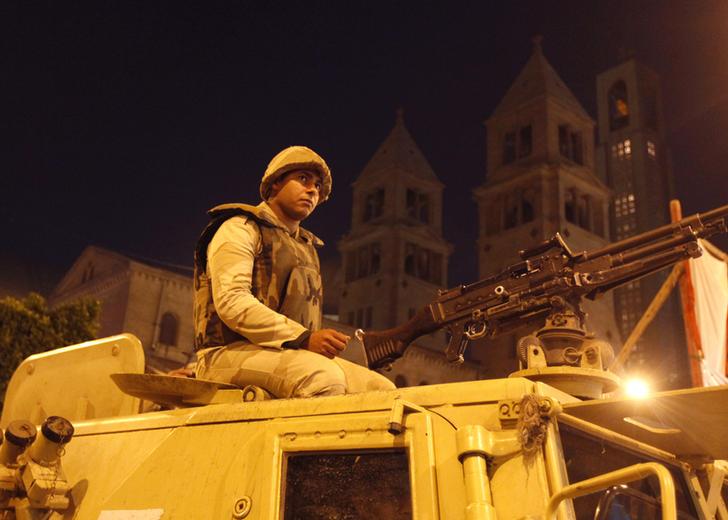Latest NEWS
- Aswat Masriya, the last word
- Roundup of Egypt's press headlines on March 15, 2017
- Roundup of Egypt's press headlines on March 14, 2017
- Former Egyptian President Hosni Mubarak to be released: lawyer
- Roundup of Egypt's press headlines on March 13, 2017
- Egypt's capital set to grow by half a million in 2017
- Egypt's wheat reserves to double with start of harvest -supply min
- Roundup of Egypt's press headlines on March 12, 2017
Joint military-police forces secure places of worship, public facilities ahead of new year's celebrations

Army soldiers guard the streets during a Coptic Christmas eve mass at the main cathedral in Cairo January 6, 2014. REUTERS/Mohamed Abd El Ghany
CAIRO, Dec. 31 (Aswat Masriya) - In congruence with the new year and Coptic Christmas celebrations, assigned teams from the Armed Forces joined the police to secure vital and public facilities, places of worship, and main roads.
Security patrols and rapid intervention forces were deployed in Greater Cairo to assist the police forces, according to a statement by the Armed Forces Thursday. Military police spread out across the capital and Giza province to assist the police with halting any attempts to disrupt celebrations.
In Alexandria, joint security patrols roam the vital neighbourhoods of the province in addition to joint protection by military and police forces of public facilities, according to the statement.
On the borders, the military in collaboration with the air forces and border guards strengthened security measures in an attempt to prevent the infiltration of “terrorist elements and outlaws” through the border.
Similar security precautions were taken in the Upper Egypt region and in Central and Northern Sinai.
Egypt has been fighting a rising militant insurgency in North Sinai, especially targeting the military and police forces, since the ouster of former president Mohamed Mursi. Frequent bomb attacks have also occurred in Greater Cairo and other provinces.
The military in conjunction with the police forces have embarked on several security campaigns in North Sinai aimed to fight extremist elements.
The Armed Forces first made an intervention in the context of the January 25 uprising in order to fill a security vacuum that resulted after the police disappeared from the streets on the night of January 28.
Since then, the military has played an important role in Egypt’s political transition. The Supreme Council of the Armed Forces (SCAF) had assumed authority over the transitional period that started immediately after Mubarak's ouster. In June 2012, Egypt's first elected president came to power, only to be deposed a year later by the Armed Forces after mass protests erupted on June 30 calling for his removal.
Former Minister of Defence during Mursi's tenure, Abdel Fattah Al-Sisi, was elected as president in May 2014 with more than 96% of the vote.










